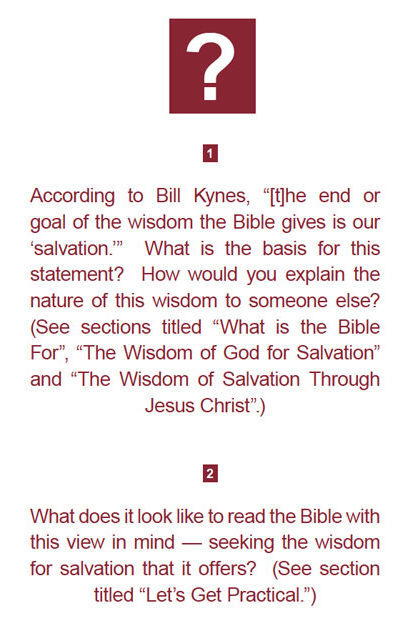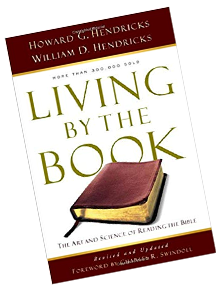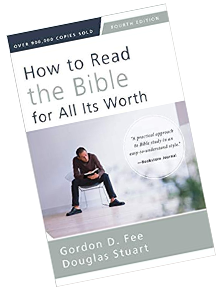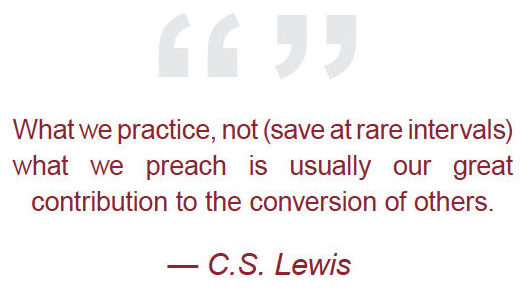Back to series
How to Read the Bible, Part 4:


Recommended Reading:
Recommended Reading:

Download or Listen to Audio
How to Read the Bible, Part 4:
How Is The Bible Useful?
Click here to open a Print - Friendly PDF
(This is a four-part series on How to Read the Bible. Part 1, Part 2, Part 3, Part 4.)
So you want to read the Bible. You believe that reading and understanding the Bible is essential to the Christian life, so you want to read it well. You want to listen to what it has to say to you because you believe that God speaks through it. This is the last of a series of four articles written to help you read God’s Word with profit.
What Is the Bible?
 We began this series with a general introduction, by considering what the Bible is. This book is, in fact, a compilation of sixty-six books, written by a least thirty different authors, spanning a period of more than a thousand years. And these books are of many different literary forms — historical narratives, poetic prophecies, proverbs, parables, laws, letters, and fantastic visions. But in all its diversity, the Bible preserves a distinct unity; superintending the many human authors in their writing is one divine Author — God Himself. Thus the Bible comes to us with a dual authorship — both human and divine. The Bible’s distinctive claim is that God uses the words of human authors to speak His message, and this divine mind has produced a unified message that is revealed in history.
We began this series with a general introduction, by considering what the Bible is. This book is, in fact, a compilation of sixty-six books, written by a least thirty different authors, spanning a period of more than a thousand years. And these books are of many different literary forms — historical narratives, poetic prophecies, proverbs, parables, laws, letters, and fantastic visions. But in all its diversity, the Bible preserves a distinct unity; superintending the many human authors in their writing is one divine Author — God Himself. Thus the Bible comes to us with a dual authorship — both human and divine. The Bible’s distinctive claim is that God uses the words of human authors to speak His message, and this divine mind has produced a unified message that is revealed in history.
The Bible tells a story. It is the story of humanity in this world from beginning to end. Its opening chapter begins with God creating the heavens and the earth in which God fashions human beings to live in relationship with Himself. Its final chapters describe the coming of a new heaven and a new earth in which God will dwell with His people in perfect peace. In between, we have a drama of a relationship disrupted by human rebellion and then restored by the gracious work of God.
This big, overarching story provides a framework within which the various smaller stories of the Bible fit. Knowing the basic plot line of the Bible provides a kind of map to help you find your way around as you explore its many parts.
The four acts of this drama can be captured in the following expressions: Creation, Fall, Redemption, and New Creation. But in the center is the supreme revelation of God — the focal point of the entire Bible — found in the four Gospels. Here we see the life, death, and resurrection of Jesus of Nazareth, the Messiah and Son of God. All that comes before points forward to Him, and all that comes after points back to Him. He is Immanuel, God with us, our Redeemer, our Savior, our Lord. As Lord, Jesus then becomes our interpretive guide to understanding the Bible rightly.
How Do We Interpret the Bible?
In part 2 of our series, we considered how to interpret the Bible, and we found that the story it tells provides the principles that govern its interpretation. It calls us to read it on its own terms, with its own interpretive framework. These principles include, first, the notion of interpretive objectivity. God exists outside of us as the ultimate Author of Scripture, and He speaks to us. We receive God's revelation, we do not create it. Second, the Bible’s message about the reality of both our finitude and our sinfulness leads us to humility in our interpretation. We confess we cannot know God’s truth exhaustively, but we affirm that we can know it adequately and truly.
Our confidence in being able to understand the Bible also derives from its message. It is good news, and as such it must be comprehensible. In addition, as God is the Author seeking to communicate with us, and His text is the Word, supremely the Word of His Son Jesus Christ, so the Holy Spirit of God is the One who comes alongside us as readers enabling us to understand what He has intended.
The Bible is a divine book, but it is also a human one. As a result, we seek the intention of the human authors as expressed through what they have written, using all the tools at our disposal — historical, cultural, religious, linguistic, and literary—that help us arrive at that intention.
Because the Bible was written over a long period of time, its revelation must be understood progressively. What each author has written must be understood in its context within the flow of God’s working in history.
And because we also believe in the Bible’s divine authorship, we assume a consistency that allows the Bible to speak with a unified message. Each part must be read in the light of the whole. Thus the Bible is its own best interpreter. What is clear and emphatic in Scripture must be allowed to interpret what is obscure and sporadic.
Jesus: God’s Supreme Revelation
At the center of the Bible’s message, its unifying theme, is Jesus Christ. This is why Christians call all that came before Him the “Old Testament.” The ways that God had related to human beings, especially as that is revealed through the history and institutions of the nation of Israel, pointed forward to the new thing God has done in Jesus. He is Israel’s promised Messiah, the heir of the throne of David, the fulfillment of God’s covenant promise to Abraham to bring blessing to all nations.
The role of Jesus as the interpretive key to the whole Bible was the theme of part 3 in our series. This principle of interpretation comes to us from Jesus Himself, for He taught His disciples to read the Hebrew Bible in this way: ”If you believed Moses, you would believe me,” Jesus said, ”for he wrote about me” (John 5:46). ”Your father Abraham rejoiced at the thought of seeing my day; he saw it and was glad” (John 8:56). ”Beginning with Moses and all the Prophets, he explained to them what was said in all the Scriptures concerning himself” (Luke 24:27). Jesus authorized His apostles to pass on all that He taught and did and to unpack its meaning, with the help of the Spirit. The Bible alone provides the context for rightly understanding Jesus; at the same time, only Jesus can give us a right understanding of the Bible.
What Is the Bible For?
 We have considered what the Bible is and how we are to understand it. But what can we expect the Bible to do for us? What is it for?
We have considered what the Bible is and how we are to understand it. But what can we expect the Bible to do for us? What is it for?
Getting this question right is critical, because, as with any document we may read, if we misjudge the Bible’s purpose, we will be disappointed if it doesn’t meet our expectations. Some people approach the Bible as a kind of Ouija board, looking to find specific answers to specific questions, such as whom should I marry? or what job should I take? Others read the Bible as a scientific textbook, giving detailed descriptions of the mechanics of cosmology or the nature of dark matter. Still others read the Bible expecting a philosophical treatise or even a systematic presentation of theological propositions. The Bible offers us none of these.
What is the Bible for? The apostle Paul addresses this question most directly in his letter to Timothy. Paul affirms Timothy’s faith and says, “how from infancy you have known the Holy Scriptures, which are able to make you wise for salvation through faith in Christ Jesus” (2 Tim. 3:14–15, emphasis added). The Bible gives us wisdom, but it is wisdom to a particular end through a particular means.
The Wisdom of God for Salvation
The end or goal of the wisdom the Bible gives is our “salvation.” The Bible does that, first, by confronting us with our need to “be saved.” As we read the Bible, we must ask ourselves, how do I fit into this story? How does this story shed light on my life?
The Bible begins with the grandeur and goodness of our great Creator, who made us in His image to know and love Him. Biblical wisdom begins with this revelation of God in His glory. “The fear of the Lord is the beginning of wisdom,” Proverbs tells us (9:10), and so the Bible reveals to us God as the rightful object of our reverent worship.
But almost immediately, things go wrong. Our first ancestors rebel against God’s gracious rule, and the forces of evil are unleashed in the world. In the stories that follow, and in the prophetic words addressed to the people of Israel, we see ourselves as those who also rebel against God and go our own way, following after our own idols that cannot provide what they promise. The Bible gives us wisdom for salvation by first convicting us of our need to be saved from a state of rebellion against God.
But the wisdom for salvation that the Bible gives also shows the way out of our lost state in which we are alienated from God and corrupt in our nature, destined for the condemnation of God. In the stories it tells, the Bible points us to a renewed relationship with God — a divine peace that also unites a people in loving relationships with one another. It also promises the coming of God’s justice in the world through His judgment of all that is evil. In fact, it reveals God’s patience and mercy in dealing with human sin and discloses God’s eternal purpose to recreate this fallen world and to live with His people forever. The Bible gives us God’s wisdom revealed in this gospel.
The Wisdom for Salvation Through Jesus Christ
The wisdom for salvation that the Bible gives, Paul tells us, is focused on faith in Jesus Christ. In Jesus we see both the supreme revelation of God (“The Son is the image of the invisible God” [Col. 1:15]) and the ideal human being in relationship to God (He is the “second man” [“second Adam”], the “heavenly man” [1 Cor. 15:47, 49]). The gospel is embodied in Jesus’s life, death, and resurrection. In this gospel, the holy love of God is demonstrated: on the cross, Jesus bears our sin, redeeming a people for Himself; in His resurrection, he becomes the first fruits of God’s new creation. The Bible is the divine testimony of this good news, and it makes us wise for this salvation through faith in Jesus Christ. John spells out this very purpose, recounting in his Gospel the many miraculous deeds Jesus performed: “These are written that you may believe that Jesus is the Messiah, the Son of God, and that by believing you may have life in his name” (John 20:31).
The wisdom given to us in the Bible not only enables us to come to faith; it also empowers us to grow in our faith, for Paul continues his words to Timothy: “All Scripture is God-breathed and is useful for teaching, rebuking, correcting and training in righteousness, so that the servant of God may be thoroughly equipped for every good work” (2 Tim. 3:16–17).
The salvation that the gospel brings is not complete until we are conformed to the very image of Christ, and the Bible is God’s tool to train us in the righteousness of Christ. As one writer has put it: “Scripture is more than informative. It is formative and transformative.”
As the word of God, the Bible is reliable in leading us to the truth that we ought to believe — right doctrine — teaching us what is true, rebuking us when we are in error. And the Bible is reliable in leading us to the truth in how we ought to live — right conduct — correcting those who act wrongly, training us in righteousness. It is profitable for us in all matters of faith and practice so that we might be able to meet all the demands God places upon us and be equipped for every good work. This is what the Bible is for.
Let’s Get Practical
Pray
 So what does it look like to read the Bible with this view in mind — seeking the wisdom for salvation that it offers? First, since the Bible is a “God-breathed” book, His word to us, it is important to pray before, and as, you read it. You will be seeking to understand what you read as you would any other book, but you will also read it as you would no other book, for you will be listening to what God is saying to you through the words of the human authors. Ask God to open your heart to what He has to say. We may stand over the Bible as interpreters, but we must stand under it as hearers to be judged, corrected, led, and fed by what we hear. We must come humbly to the Bible, willing to listen and obey, for as the Lord says through the prophet Isaiah,
So what does it look like to read the Bible with this view in mind — seeking the wisdom for salvation that it offers? First, since the Bible is a “God-breathed” book, His word to us, it is important to pray before, and as, you read it. You will be seeking to understand what you read as you would any other book, but you will also read it as you would no other book, for you will be listening to what God is saying to you through the words of the human authors. Ask God to open your heart to what He has to say. We may stand over the Bible as interpreters, but we must stand under it as hearers to be judged, corrected, led, and fed by what we hear. We must come humbly to the Bible, willing to listen and obey, for as the Lord says through the prophet Isaiah,
These are the ones I look on with favor:
those who are humble and contrite in spirit,
and who tremble at my word. (Isa. 66:2)
Read in Context
Second, it is best, especially if you are a beginner, to read the books of the Bible straight through, rather than just picking a few verses here or there. This helps you to read verses in context. Consider where the book you are reading fits in the biblical story. (The introduction in a study Bible can help.) Read slowly and carefully, paying attention to clues that the writer gives to his intention and emphasis.
Ask Questions
Third, it is often helpful to ask basic questions of the text. I think, for example, of Paul’s two questions when he encountered the risen Christ on the road to Damascus: Who are You, Lord? And what must I do?
As you read the Bible, ask questions such as what does this passage tell me about who God is? What does it say about God's moral character, His righteous judgment, His sovereign rule, His saving purpose, and His faithfulness to His promises? What does this passage say about human nature — our dignity as those created in God’s image or our depravity as those corrupted by sin? How does it point to our need of a Savior? How does it point me to the gospel of Christ? Does the passage present a good example to follow or a bad example to avoid? What promises does it offer for me to trust? What commands does it present for me to obey?
These questions help us to reflect on the significance of what we read for our understanding of God and His desire for our lives.
Seek Application
With application we are moving toward our response—for we must always come to God’s Word with an openness to being changed by what we read. The Bible itself calls us to apply its message to our lives (see Matt. 7:24–27; 28:20; James 1:22).
We must ask, so what? What must I do with what I have read? That response may be one of praise — worshiping the God who is revealed in the Scriptures. We may be led to give thanks as we are reminded of God’s goodness. We may be convicted of something in our lives and be led to confess and repent. We may be encouraged to stay spiritually alert as we are warned of some danger—either in some theological error to avoid or some temptation to turn away from. We may be called to change our behavior in some way in light of the vision of godly living that we see displayed.
Make Cultural and Situational Transpositions
 In reading the Bible, we must appreciate that it was written for us, but not to us. We must first ask, how did the biblical author want his readers to respond? Was there a command to obey, a promise to claim, an example to follow or to avoid, a warning to heed, a teaching to act on, or a truth to believe? But the writer’s original audience was in a very different historical and cultural context. Some of Paul’s letters, for example, address very specific situations. We will need wisdom to know if the original author’s intended response is limited to the original context or has broader application to us.
In reading the Bible, we must appreciate that it was written for us, but not to us. We must first ask, how did the biblical author want his readers to respond? Was there a command to obey, a promise to claim, an example to follow or to avoid, a warning to heed, a teaching to act on, or a truth to believe? But the writer’s original audience was in a very different historical and cultural context. Some of Paul’s letters, for example, address very specific situations. We will need wisdom to know if the original author’s intended response is limited to the original context or has broader application to us.
In part 3 of this series, we noted the significance the coming of Christ makes to the application of the Mosaic law. Laws that were given to Israel as a nation-state and those that regulated temple worship must be understood in new ways after the law’s fulfillment in the person and work of Christ. The New Testament must help us in making that transposition.
Sometimes proper application involves determining what general principle may be embodied in a particular passage that can then be transposed to apply to our contemporary context. For example, it may be appropriate to change Paul’s command to “greet one another with a holy kiss,” given in a context in which kissing was a common cultural form of greeting, to “welcome one another with a warm handshake” when that is the cultural norm.
Jesus Himself pointed to the way that a specific command can also have a wider meaning. In His Sermon on the Mount, for example, He expanded the prohibition against murder into a more general prohibition of anger and a prohibition of adultery into a condemnation of lust.
Read the Bible with God’s People
In reading the Bible, we must appreciate that it was written for us, but not to us. We must first ask, how did the biblical author want his readers to respond? Was there a command to obey, a promise to claim, an example to follow or to avoid, a warning to Understanding and applying the Bible rightly takes wisdom. That’s why we must pray, but that is also why it is best to read the Bible and to seek to apply it in the company of God’s people in the church. We need the wisdom and insight of other believers — both present and past — as we seek to read the Bible well. God gives the church gifted teachers who help us, and we should beware of depending only on our own understanding when reading the Bible. If I have an interpretation of a biblical passage that no one has ever had before, I would be inclined to conclude I was wrong!
Respond in Faith and Obedience
In reading the Bible, we must appreciate that it was written for us, but not to us. We must first ask, how did the biblical author want his readers to respond? Was there a command to obey, a promise to claim, an example to follow or to avoid, a warning to Finally, reading the Bible includes the obligation to respond to what we read with faith and obedience. It is the Word of God, after all! Remember, the Bible is not the end; it is the means — the means by which we come to hear the voice of God and come to know His gospel in the person of His Son by the power of the Holy Spirit. As we hear God’s voice and respond in faith and obedience, we grow in our love for Him and in our conformity to the image of Christ. May we end where we began — in prayer, as we speak to God, appropriately responding to the way He has first spoken to us.
Take Up and Read!
 In reading the Bible, we must appreciate that it was written for us, but not to us. We must first ask, how did the biblical author want his readers to respond? Was there a command to obey, a promise to claim, an example to follow or to avoid, a warning to The translation team of the King James Bible (1611) wrote a preface to its work that not only addressed the team’s patron, the king, but also the “gentle reader.” They urged these ordinary men and women to read, search, study, and love the sacred Scriptures. I conclude with their encouragement and admonition:
In reading the Bible, we must appreciate that it was written for us, but not to us. We must first ask, how did the biblical author want his readers to respond? Was there a command to obey, a promise to claim, an example to follow or to avoid, a warning to The translation team of the King James Bible (1611) wrote a preface to its work that not only addressed the team’s patron, the king, but also the “gentle reader.” They urged these ordinary men and women to read, search, study, and love the sacred Scriptures. I conclude with their encouragement and admonition:
In reading the Bible, we must appreciate that it was written for us, but not to us. We must first ask, how did the biblical author want his readers to respond? Was there a command to obey, a promise to claim, an example to follow or to avoid, a warning to But now what piety without truth? What truth (what saving truth) without the Word of God? What Word of God (whereof we may be sure) without the Scriptures? The Scriptures we are commanded to search. They are commended that searched and studied them. They are reproved that were unskilled in them, or slow to believe them. They can make us wise unto salvation. If we be ignorant, they will instruct us; if out of the way, they will bring us home; if out of order, they will reform us; if in heaviness, comfort us; if dull, quicken us; if cold, inflame us. Tolle, lege; tolle, lege, “Take up and read; take up and read.”4
Notes:
1 On the role of the Spirit, see Vern Poythress, “Why Must Our Hermeneutics Be Trinitarian,” (Southern Baptist Journal of Theology 10, no. 1, Spring 2006), 96–98. Also Kevin J. Vanhoozer, Is There a Meaning in This Text? (Grand Rapids: Zondervan, 1998).
2 Scripture quotations are from New International Version.
3 Kevin J. Vanhoozer, Pictures at a Theological Exhibition: Scenes of the Church's Worship, Witness and Wisdom (Downers Grove, IL: InterVarsity, 2016), 186.
4 Cited in Timothy George, Reading Scripture with the Reformers (Downers Grove, IL: IVP Academic), 255. “Take up and read” is from St. Augustine’s Confessions.

William L. Kynes
Pastor, Senior Fellow for Pastoral Theology, CSLI Pastor William L. "Bill" Kynes is the Senior Fellow for Pastoral Theology at the C.S. Lewis Institute, and retired Senior Pastor of Cornerstone, an Evangelical Free Church, in Annandale, VA, where he served from 1986 - 2022. He was an undergraduate at the University of Florida with a major in philosophy. There he also played quarterback and was later inducted into the university’s Athletic Hall of Fame. He attended Oxford University as a Rhodes Scholar, receiving an MA in theology. He received an MDiv from Trinity Evangelical Divinity School, before returning to England for a PhD in New Testament from Cambridge University. From 1997-1999, he served as an adjunct professor in New Testament for the Trinity Evangelical Divinity School Washington, DC, Extension Program.
Recommended Reading:
Howard G. Hendricks and William D. Hendricks, Living by the Book: The Art and Science of Reading the Bible (Moody Publishers, New edition, 2007)
 For every person who draws strength and direction from the Bible, there are many more who struggle with it. Some call it a long book with fine print and obscure meaning. Some call it a mystery, a chore to read, or an undecipherable puzzle.
For every person who draws strength and direction from the Bible, there are many more who struggle with it. Some call it a long book with fine print and obscure meaning. Some call it a mystery, a chore to read, or an undecipherable puzzle.
The good news is you can easily solve this problem. With over 300,000 sold, this revised and expanded edition of Living by the Book will remove the barriers that keep Scripture from transforming your life. In a simple, step-by-step fashion, the authors explain how to glean truth from Scripture. It is practical, readable, and applicable. By following its easy-to-apply principles, you'll soon find yourself drawing great nourishment from the Word — and enjoying the process! The Living by the Book Workbook, available separately, is the perfect complement to provide practical application of lessons.
Recommended Reading:
Gordon D. Fee and Douglas Stuart, How to Read the Bible for All Its Worth (Zondervan Academic, Fourth edition, 2014)
 Understanding the Bible isn’t for the few, the gifted, the scholarly. The Bible is accessible. It’s meant to be read and comprehended by everyone from armchair readers to seminary students. A few essential insights into the Bible can clear up a lot of misconceptions and help you grasp the meaning of Scripture and its application to your twenty-first-century life.
Understanding the Bible isn’t for the few, the gifted, the scholarly. The Bible is accessible. It’s meant to be read and comprehended by everyone from armchair readers to seminary students. A few essential insights into the Bible can clear up a lot of misconceptions and help you grasp the meaning of Scripture and its application to your twenty-first-century life.
More than three quarters of a million people have turned to How to Read the Bible for All Its Worth to inform their reading of the Bible. This fourth edition features revisions that keep pace with current scholarship, resources, and culture.
Covering everything from translational concerns to different genres of biblical writing, How to Read the Bible for All Its Worth is used all around the world. In clear, simple language, it helps you accurately understand the different parts of the Bible — their meaning for ancient audiences and their implications for you today — so you can uncover the inexhaustible worth that is in God’s Word.
 COPYRIGHT: This publication is published by C.S. Lewis Institute; 8001 Braddock Road, Suite 301; Springfield, VA 22151. Portions of the publication may be reproduced for noncommercial, local church or ministry use without prior permission. Electronic copies of the PDF files may be duplicated and transmitted via e-mail for personal and church use. Articles may not be modified without prior written permission of the Institute. For questions, contact the Institute: 703.914.5602 or email us.
COPYRIGHT: This publication is published by C.S. Lewis Institute; 8001 Braddock Road, Suite 301; Springfield, VA 22151. Portions of the publication may be reproduced for noncommercial, local church or ministry use without prior permission. Electronic copies of the PDF files may be duplicated and transmitted via e-mail for personal and church use. Articles may not be modified without prior written permission of the Institute. For questions, contact the Institute: 703.914.5602 or email us.
-
Recent Podcasts
The Faith of Jonathan Edwards
by Aimee Riegert, Arthur W. Lindsley on November 1, 2024Jonathan Edwards has been described as the greatest...Read More
-
A Scientist’s Journey to God – Krister Renard’s story
by Krister Renard, Jana Harmon on October 25, 2024
-
The Faith of Francis Schaeffer
by Arthur W. Lindsley, Aimee Riegert on October 18, 2024
-
Recent Publications
Will You Be Ready?
by Thomas A. Tarrants on October 23, 2024Tom Tarrants gives insights on how we can...Read More
-
Should Christians Be Involved with Politics?
by Kerry A. Knott on October 1, 2024
-
Isn ’t Atheism Based on Scientific Fact Whereas Christianity is Based on “Faith”?
by Cameron McAllister on September 1, 2024
0
All Booked
0.00
All Booked
0.00
All Booked
23169
ADVENT CALENDAR: The Amazing Prophecies Fulfilled by the Birth of Jesus Christ
https://www.cslewisinstitute.org/?event=advent-calendar-the-amazing-prophecies-fulfilled-by-the-birth-of-jesus-christ&event_date=2024-11-28®=1
https://www.paypal.com/cgi-bin/webscr
2024-11-28

Next coming event
Days
Hours
Minutes
Seconds
ADVENT CALENDAR: The Amazing Prophecies Fulfilled by the Birth of Jesus Christ
On November 28, 2024 at 6:00 amCategories
Speakers

William L. Kynes
Pastor, Senior Fellow for Pastoral Theology, CSLI
Team Members

William L. Kynes
Pastor, Senior Fellow for Pastoral Theology, CSLIPastor William L. "Bill" Kynes is the Senior Fellow for Pastoral Theology at the C.S. Lewis Institute, and retired Senior Pastor of Cornerstone, an Evangelical Free Church, in Annandale, VA, where he served from 1986 - 2022. He was an undergraduate at the University of Florida with a major in philosophy. There he also played quarterback and was later inducted into the university’s Athletic Hall of Fame. He attended Oxford University as a Rhodes Scholar, receiving an MA in theology. He received an MDiv from Trinity Evangelical Divinity School, before returning to England for a PhD in New Testament from Cambridge University. From 1997-1999, he served as an adjunct professor in New Testament for the Trinity Evangelical Divinity School Washington, DC, Extension Program.





